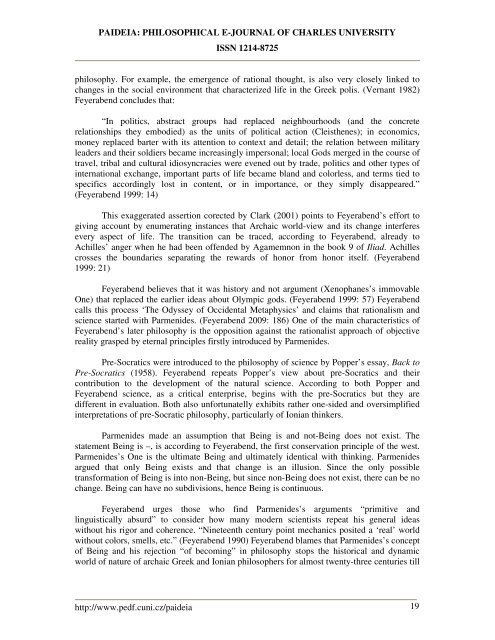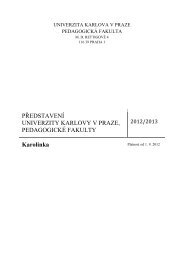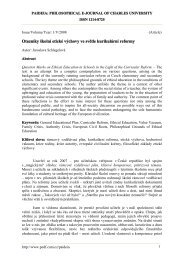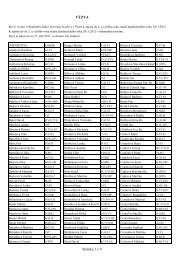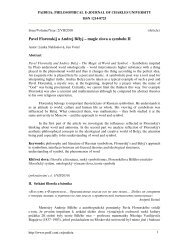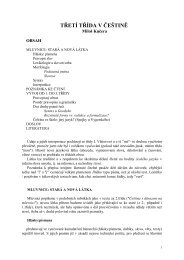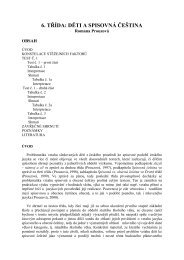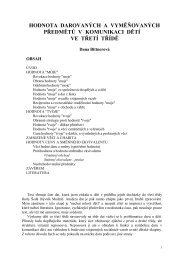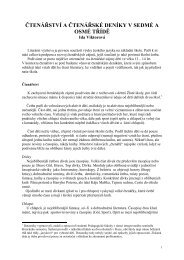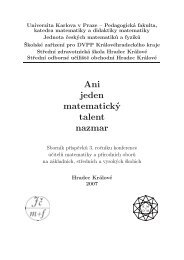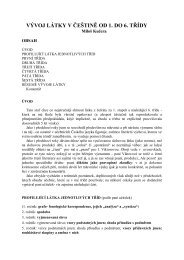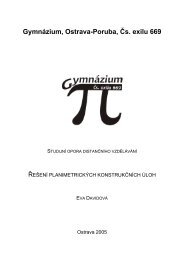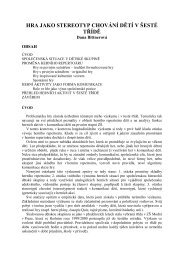Feyerabend's interpretation of Archaic Age
Feyerabend's interpretation of Archaic Age
Feyerabend's interpretation of Archaic Age
Create successful ePaper yourself
Turn your PDF publications into a flip-book with our unique Google optimized e-Paper software.
PAIDEIA: PHILOSOPHICAL E-JOURNAL OF CHARLES UNIVERSITYISSN 1214-8725philosophy. For example, the emergence <strong>of</strong> rational thought, is also very closely linked tochanges in the social environment that characterized life in the Greek polis. (Vernant 1982)Feyerabend concludes that:“In politics, abstract groups had replaced neighbourhoods (and the concreterelationships they embodied) as the units <strong>of</strong> political action (Cleisthenes); in economics,money replaced barter with its attention to context and detail; the relation between militaryleaders and their soldiers became increasingly impersonal; local Gods merged in the course <strong>of</strong>travel, tribal and cultural idiosyncracies were evened out by trade, politics and other types <strong>of</strong>international exchange, important parts <strong>of</strong> life became bland and colorless, and terms tied tospecifics accordingly lost in content, or in importance, or they simply disappeared.”(Feyerabend 1999: 14)This exaggerated assertion corected by Clark (2001) points to Feyerabend’s effort togiving account by enumerating instances that <strong>Archaic</strong> world-view and its change interferesevery aspect <strong>of</strong> life. The transition can be traced, according to Feyerabend, already toAchilles’ anger when he had been <strong>of</strong>fended by Agamemnon in the book 9 <strong>of</strong> Iliad. Achillescrosses the boundaries separating the rewards <strong>of</strong> honor from honor itself. (Feyerabend1999: 21)Feyerabend believes that it was history and not argument (Xenophanes’s immovableOne) that replaced the earlier ideas about Olympic gods. (Feyerabend 1999: 57) Feyerabendcalls this process ‘The Odyssey <strong>of</strong> Occidental Metaphysics’ and claims that rationalism andscience started with Parmenides. (Feyerabend 2009: 186) One <strong>of</strong> the main characteristics <strong>of</strong>Feyerabend’s later philosophy is the opposition against the rationalist approach <strong>of</strong> objectivereality grasped by eternal principles firstly introduced by Parmenides.Pre-Socratics were introduced to the philosophy <strong>of</strong> science by Popper’s essay, Back toPre-Socratics (1958). Feyerabend repeats Popper’s view about pre-Socratics and theircontribution to the development <strong>of</strong> the natural science. According to both Popper andFeyerabend science, as a critical enterprise, begins with the pre-Socratics but they aredifferent in evaluation. Both also unfortunatelly exhibits rather one-sided and oversimplified<strong>interpretation</strong>s <strong>of</strong> pre-Socratic philosophy, particularly <strong>of</strong> Ionian thinkers.Parmenides made an assumption that Being is and not-Being does not exist. Thestatement Being is –, is according to Feyerabend, the first conservation principle <strong>of</strong> the west.Parmenides’s One is the ultimate Being and ultimately identical with thinking. Parmenidesargued that only Being exists and that change is an illusion. Since the only possibletransformation <strong>of</strong> Being is into non-Being, but since non-Being does not exist, there can be nochange. Being can have no subdivisions, hence Being is continuous.Feyerabend urges those who find Parmenides’s arguments “primitive andlinguistically absurd” to consider how many modern scientists repeat his general ideaswithout his rigor and coherence. “Nineteenth century point mechanics posited a ‘real’ worldwithout colors, smells, etc.” (Feyerabend 1990) Feyerabend blames that Parmenides’s concept<strong>of</strong> Being and his rejection “<strong>of</strong> becoming” in philosophy stops the historical and dynamicworld <strong>of</strong> nature <strong>of</strong> archaic Greek and Ionian philosophers for almost twenty-three centuries tillhttp://www.pedf.cuni.cz/paideia 19


